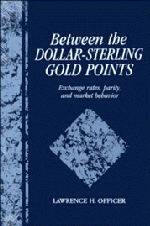Book contents
- Frontmatter
- Contents
- List of figures
- List of tables
- Preface
- List of symbols
- 1 Introduction
- Part I Monetary standards
- Part II Exchange rate
- Part III Gold points
- Part IV External and internal integration
- Part V Market efficiency
- Part VI Regime efficiency
- Part VII Conclusions
- 17 Summary and conclusions
- Notes
- References
- Index
17 - Summary and conclusions
Published online by Cambridge University Press: 13 October 2009
- Frontmatter
- Contents
- List of figures
- List of tables
- Preface
- List of symbols
- 1 Introduction
- Part I Monetary standards
- Part II Exchange rate
- Part III Gold points
- Part IV External and internal integration
- Part V Market efficiency
- Part VI Regime efficiency
- Part VII Conclusions
- 17 Summary and conclusions
- Notes
- References
- Index
Summary
Institutions
A country's domestic and international monetary standards – be they metallic (gold, silver, or bimetallic) or paper – can differ, as can its effective and legal domestic standard (sections 1 and 4 of chapter 2).
A gold (or other metallic) standard involves both domestic and international conditions (sections 2 and 3 of chapter 2).
The monetary system of colonial times continued to exist in the United States to the mid-1790s, with no effective American mint until 1794 (sections 1 and 2 of chapter 3).
The gold value of the dollar was unchanged from 1837 to 1934 (section 2 of chapter 3).
The United States was formally bimetallic until 1873–1874, when silver was legally demonetized (section 3 of chapter 3).
Several kinds of US government or central bank paper currency convertible into coin on demand were authorized, between 1861 and 1913 (section 4 of chapter 3).
The important US Mint Acts, that determined coinage of private bullion and provision of gold bars, were in 1792, 1834, 1837, 1853, and 1882 (sections 5 and 6 of chapter 3).
Banks were a late development in American history, and were of four types: federal, private, state, and national (section 7 of chapter 3).
Disregarding paper standards, the United States was on an effective silver standard to 1834 and a gold standard thereafter (section 8 of chapter 3).
[…]
- Type
- Chapter
- Information
- Between the Dollar-Sterling Gold PointsExchange Rates, Parity and Market Behavior, pp. 279 - 284Publisher: Cambridge University PressPrint publication year: 1996

